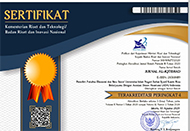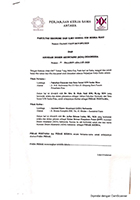SEKTOR PARIWISATA, PENGANGGURAN DAN PERTUMBUHAN EKONOMI DI INDONESIA
Abstract
This study aims to empirically prove the influence of the number of tourists, hotel room occupancy rates, and unemployment on economic growth in Indonesia. This research deliberately takes the population of tourists, hotel room occupancy rates, unemployment, and economic growth in Indonesia with annual data from 1991 to 2020 and uses a purposive sampling technique method. The analytical tool used in this research is multiple linear regression. The test results found that the variable number of tourists had a significant negative effect on the GDP variable in Indonesia. While the hotel room occupancy rate variable has a significant positive effect on the GDP variable in Indonesia. Furthermore, the unemployment variable has no effect on the GDP variable in Indonesia. Based on the test results, this study provides several implications both theoretically and practically. From a theoretical point of view, this study provides an overview of the level of contribution of the independent variables (number of tourists, hotel room occupancy rates, and unemployment) that affect the dependent variable (GDP). From a practical point of view, this research certainly provides an illustration of the extent to which government policy is involved in strengthening the influence of the variable number of tourists, hotel room occupancy rates, and unemployment on the GDP variable in Indonesia.
Keywords
References
Abdullah, M. F. (2004). Dasar-dasar manajemen keuangan. Malang: Universitas Muhammadiyah.
Aliansyah, H., & Hermawan, W. (2019). Peran sektor pariwisata pada pertumbuhan ekonomi Kabupaten/Kota di Jawa Barat. Jurnal Bina Ekonomi, 23(1), 39-55.
Amnar, S. (2017). Pengaruh pariwisata terhadap pertumbuhan ekonomi Kota Sabang. Jurnal Ekonomi dan Kebijakan Publik Indonesia, 4(1).
Arsyad, L. (2015). Ekonomi pembangunan. Yogyakarta: UPP STIM YKPN.
Austriana, I. (2005). Analisis faktor yang mempengaruhi penerimaan daerah dari sektor pariwisata di Jawa Tengah. Jurusan Akuntansi Universitas Diponegoro, Semarang.
Chiu, Y. B., & Yeh, L. T. (2017). The threshold effects of the tourism-led growth hypothesis: Evidence from a cross-sectional model. Journal of Travel Research, 56(5), 625-637.
Fadhila, R. S.,& Rahmini, N. (2019). Pengaruh jumlah kunjungan wisatawan, tingkat hunian hotel, lama menginap wisatawan terhadap pertumbuhan ekonomi Provinsi Kalimantan Selatan. Jurnal Ilmu Ekonomi dan Pembangunan, 2(1), 21-32.
Ghozali, Imam. 2016. Aplikasi Analisis Multivariete Dengan Program (IBM SPSS). Edisi 8. Semarang: Badan Penerbit Universitas Diponegoro.
Gunawan, Imam. 2016. Pengantar Statistika Inferensial. Jakarta: Rajawali Press.
Hadiwardoyo, W. (2020). Kerugian ekonomi nasional akibat pandemi covid-19. Journal of Business and Entrepreneurship, 2(2), 83-92.
Jalil, A., Mahmood, T., & I, M. (2013). Tourism-growth nexus in Pakistan: Evidence from ARDL bounds tests. Economic Modelling, 35, 185-191.
Mankiw. (2006). Makro ekonomi. Jakarta: Erlangga.
Nizar, M. (2011). Pengaruh pariwisata terhadap pertumbuhan ekonomi di Indonesia. Jurnal Kepariwisataan Indonesia, 6(2), 195-211.
Noor, J. (2015). Metodologi penelitian: Skripsi, tesis, disertasi, dan karya ilmiah. Jakarta: Prenadamedia Group.
Nugraha, Y. E. (2021). Dampak pandemi covid-19 pada unit usaha pariwisata di kawasan pesisir Kota Kupang. Jurnal Industri Pariwisata, 3(2).
Pendit, N. S. (1999). Ilmu Pariwisata (Sebuah Pengantar Pertama). Jakarta: PT. Pradnya Paramita.
Pertiwi, N. L. G. A., Budhi., IMKS., & Saskara, I. A. N. (2017).
Pengaruh jumlah kunjungan wisatawan, tingkat hunian kamar, jumlah restoran terhadap pajak hotel & restoran dan PDRB Kawasan Regional Sarbagita di Provinsi Bali. Buletin Studi Ekonomi, 22(1), 10-20.
Pramesthi, R. N. (2013). Pengaruh pengangguran dan inflasi terhadap pertumbuhan ekonomi di Kabupaten Trenggalek. Jurnal Pendidikan Ekonomi, 1(3)
Purwanti, N. D., & Dewi, R. M. (2014). Pengaruh jumlah kunjungan wisatawan terhadap pendapatan asli daerah Kabupaten Mojokerto tahun 2006-2013. Jurnal Pendidikan Ekonomi (Jupe), 2(3)
Rediteani, N. M., Setiawani, N. D. (2018). Pengaruh jumlah kunjungan wisatawan, lama tinggal dan tingkat hunian hotel terhadap pajak hotel restoran dan pertumbuhan ekonomi di Kota Denpasar. E-Jurnal EP Unud, 7(1), 114-133.
Rosita. (2020). Pengaruh pandemi covid-19 terhadap UMKM di Indonesia. Jurnal Lentera Bisnis, 9(2), 109-120.
Samimi, A., & Sadeghi, S. (2011). Tourism and economic growth in developing countries. Middle-East Journal of Scientific Research, 10(1), 28-32.
Sekaran, U., & Bougie, R. (2016). Research methods for business (Seventh). John Wiley dan Sons.
Suastika, I. G. Y., & Yasa, I. N. M. (2017). Pengaruh jumlah kunjungan wisatawan, lama tinggal wisatawan dan tingkat hunian hotel terhadap pendapatan asli daerah dan kesejahteraan masyarakat pada Kabupaten/Kota di Provinsi Bali. Jurnal Ekonomi Pembangunan, 6(7), 1332-1363.
Sujarweni, Wiratna. 2015. Metodologi Penelitian Bisnis dan Ekonomi. Yogyakarta: Pustaka Baru Press.
Sukirno, S. (2004). Makro ekonomi teori pengantar. Jakarta: PT. Raja Grafindo Persada.
Sukirno, S. (2012). Pengantar teori ekonomi makro ekonomi. Jakarta: Raja Grafindo Persada.
Sutrisno, C. D. (2013). Pengaruh jumlah obyek wisata, jumlah hotel, dan PDRB terhadap retribusi pariwisata Kabupaten/Kota di Jawa Tengah. Economics Development Analysis Juornal.2.4.
Syarun, M. M. (2016). Inflasi, pengangguran dan pertumbuhan ekonomi di negara-negara Islam. Jurnal Ekonomi Islam, 7.
Todaro, P. M. (1998). Pembangunan ekonomi di Dunia ke-3. Jakarta: Erlangga.
Todaro, P. M., & Smith, S. (2006). Pembangunan ekonomi. Edisi Kesembilan. Jakarta: Erlangga.
Wardhana, A. (2019). Dampak sektor pariwisata terhadap pertumbuhan ekonomi (Studi kasus: 8 negara ASEAN). Jurnal Ekonomi dan Bisnis, 8(10).
DOI: http://dx.doi.org/10.24014/jiq.v18i1.16827
Refbacks
- There are currently no refbacks.














